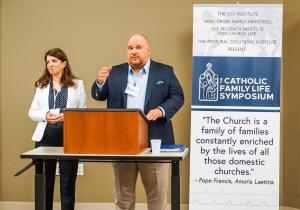For most Catholic parents, nothing’s more important than raising our kids to be faithful, godly adults.
Sadly, a study by CARA at Georgetown found that 89% of people who eventually left the Church said they’d actually lost their faith between the ages of 10 and 13. The good news is that there’s a lot you can do to help your kids negotiate their doubts.
When your child expresses doubts about God, begin by thanking them for trusting you, and telling them you’re proud of them. Why? Because doubts are a natural part of mature faith development.
In fact, the reason so many kids lose their faith between 10 and 13 is that they’re transitioning from the “Story and Structure Stage” of faith–that focuses on learning rules, rituals, and stories–to the “Relationship and Mission Stage” where kids need to learn to apply their faith to real life problems.
This transition comes with lots of questions. Without patient guidance, kids can start thinking of faith as just a bunch of rules, rituals, and stories that have no real practical bearing on their world.
After you’ve diffused things, start asking questions. Don’t grill them. Just explain that you’d like to understand what’s going on. In particular, ask if they’re having a hard time applying their faith to some challenge they’re facing. Nine times out of 10, teens’ faith crises are either caused by difficulties with reconciling their faith with real-life problems, or being led to believe that their faith is an obstacle to having meaningful relationships and finding their place in the world.
Of course, another reason kids have doubts about God is that they may have never actually MET him! Going to church isn’t enough. Make sure that you’re praying daily as a family, and when you do, make sure you’re not just saying words at God, but actually modeling how to talk to him as the person who knows you best and loves you most.
Finally, help your kids express their doubts directly to God. Teach them to pray, “Lord, I’m having a hard time believing in you. Please show me that you are real.”
For more ideas on how to help your kids through faith struggles, check out Discovering God Together: The Catholic Guide to Raising Faithful Kids.









